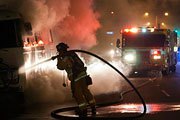Fire Chief: Most Smoke Alarms Are Useless, Endanger Users
Fire alarms make you feel safe, but an Albany, Calif. fire chief says it’s a false sense of security. Speaking to the San Francisco Chronicle, the chief says most people equip their homes with cheaper ionization alarms, which detect smoke via an electric current and can lead to false alarms (such as reacting to overcooked food) while missing genuine dangers until it’s too late. The chief says people should opt for slightly more expensive photoelectric alarms, which use more accurate light beams to alert fire victims.
According the story, ionization alarms run about $10 while photoelectric versions cost $15.
The chief tells the Chronicle:
Ionization alarms are the ones that go off when you burn your toast, and they can be so annoying that nearly a quarter of the people who own them turn them off. But even more important, they go off a lot slower than photoelectrics, and by the time you hear them it can be too late. We absolutely have to get rid of them.
Here’s an Amazon link to some photoelectric alarms.
UPDATE: The friendly technical experts over at Consumer Reports (also published by Consumers Union, our parent company), let us know that they have information about smoke and Co2 detectors that you might like to peruse.
Their report says that the ionization alarms are indeed prone to false alarms and recommends placing them away from the kitchen and bath. Here’s the scoop:
Ionization smoke alarms
The ones we tested were all excellent at detecting the small particles typical of fast, flaming fires, but all were poor at detecting smoky, smoldering fires. Ionization units are generally prone to false alarms from burnt food and steam, so don’t mount them near a kitchen or bath.
Albany fire chief urges switching smoke alarms [San Francisco Chronicle]
(Thanks, Paul!)
Want more consumer news? Visit our parent organization, Consumer Reports, for the latest on scams, recalls, and other consumer issues.


